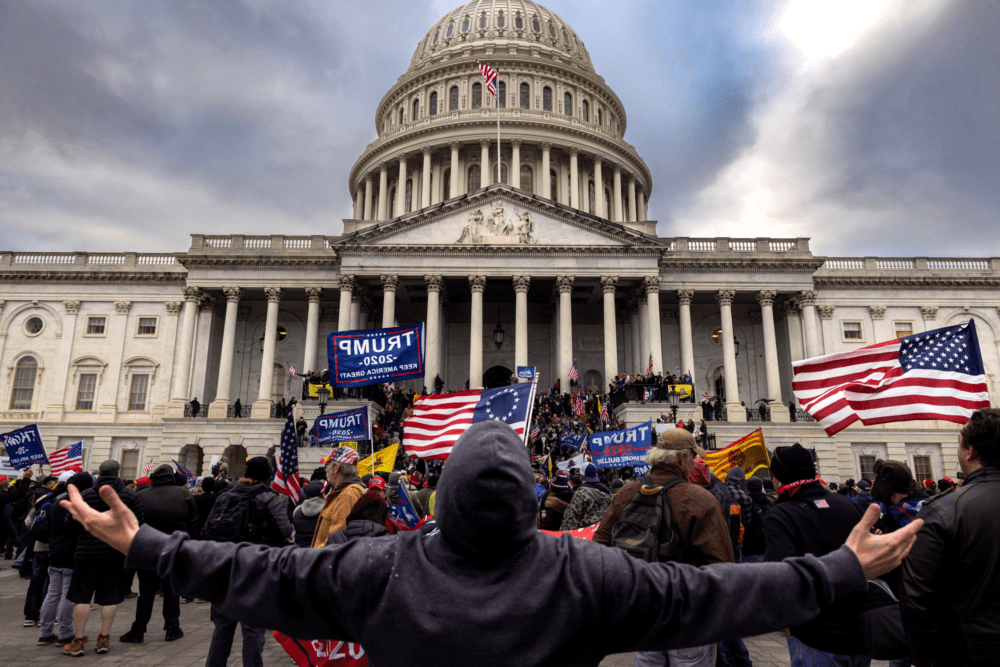Advertisement
What congressional investigations are revealing about the Capitol insurrection
Resume
Just how far was President Trump – and his team – willing to go to overthrow the results of the 2020 election?
"What we're finding out is that Trump wasn't just making throwaway lines at rallies, he was actually giving instructions to people at the highest levels of the U.S. government. And they followed his orders," professor Brian Klaas says.
Newly released documents in a congressional investigation show that at some point, it was suggested that Trump declare a National Emergency to overturn the election.
There's more. Text messages to former chief of staff, Mark Meadows.
"Quote, 'Mark. The president needs to tell people in the Capitol to go home. This is hurting all of his. He is destroying his legacy,'" Rep. Liz Cheney read at a committee hearing.
Today, On Point: The latest on investigating January 6th.
"It's blatant corruption," Klaas adds. "It's blatant attempts to rig elections, and it's blatant attempts to turn American democracy into an authoritarian mess."
Guests
Quinta Jurecic, fellow at the Brookings Institution. Senior editor at the Lawfare Blog. (@qjurecic)
Brian Klaas, professor of global politics at University College London. Author of "Corruptible: Who Gets Power And How it Changes Us." (@brianklaas)
Interview Highlights
What do you see in the text messages that were sent to Meadows not just on January 6th, but even in the days preceding it?
Quinta Jurecic: “They don't necessarily raise my baseline level of alarm about what was happening on January 6th, and in the weeks and months preceding. But that's only because my baseline was already so high. We already knew that the White House, and Trump's associates outside the White House, were pulling every lever they could, trying everything they could think of in order to overturn the election and keep Trump in power, despite the fact that a majority of American voters selected Joe Biden as the president.
"That is deeply, profoundly concerning. These text messages, I think add important detail to that story. They add color. I think they're sort of immediately arresting in a way that is maybe good, insofar as it redirects public attention to just how dire the situation was — and is — a year later when maybe memories have faded a little bit. But I don't think they substantially change the picture of what happened.”
Mark Meadows had another phone, which according to the New York Times, apparently has 'some 1,000' messages on it. Meadows says he has turned the phone over to his service provider. What do you think about that?
Brian Klaas: “It's crucially important for record keeping, for accountability that all of these things get turned over to the committee. And I think we need to have a full picture. But I think we also have to understand that we don't need those texts to understand what happened. And I think that what's important, I think I agree completely with Quinta ... is that this is a situation that requires public attention to be brought back to January 6th, the events around it, and the ongoing attempts to subvert democracy in America.
"And that's where these text messages are so important. Because the news is built around breaking information. So if you have this one big fact that comes out, like exactly what we know happened. Trump incited this movement that then tried to overthrow an election, overturn an election. That's hard to convey to people who are reading the news every single day. You just can't keep writing the same story. So what the Jan. 6th committee, I think they're trying to play this in a smart way. What they'll do is they'll continually drip this information out so that it maintains primacy in the news cycle heading up towards the anniversary. And I expect we're going to get more revelations as a result of that."
On the existence of a 38-page PowerPoint sent to Mark Meadows, and what the PowerPoint means for democracy
Brian Klaas: “The PowerPoint is interesting in this regard because of the way that pro-Trump commentators tried to spin the events of Jan. 6th. That point to the clip you had a second ago about Sean Hannity saying, Oh, you know, there were bad actors who had infiltrated, and they're always on the fringe. And these aren't actually the real Trump supporters.
"What we're finding out is that the bad actors are central to the story of who's in the White House, who's around the White House, who's in Congress. These people had access. They were speaking in the ears of legal experts, of senators and House members who were voting to overturn the election. They were not fringe lunatics. They were people who may have had lunatic conspiracy theories, but they actually had power. They had access. And I think that's so important.
"And I think it's also important to understand that the texts and the story of Jan. 6th is not trying to recreate something from the past. It's trying to understand something that's ongoing. This dynamic still exists, right? I mean, the person who was behind writing the PowerPoint, the kernel that you just mentioned, Phil Waldron, he's been invited to speak to local and state Republican groups currently. This is not some has-been, he's not been discredited. He's just been shuffled away from the White House, to other elements of the Republican Party.
"And so this this shift in Republican Party politics towards an unapologetic embrace of tactics that aim to subvert elections in the United States is not a historical story. It's an ongoing and future story that we have to take extraordinarily seriously to protect elections going into 2022 and 2024."
On why it's 'symbolically important' for Congress to hold investigations
Quinta Jurecic: “I think it's important to contextualize the investigation as an investigation by Congress. Which, as you say, is, of course, a political branch of government. But it's symbolically important to see Congress itself engaging in this kind of investigation for two reasons, I'd argue. First is that, of course, the Jan. 6th insurrection was an attack on Congress. And so I think it's sort of symbolically important as a matter of showing the strength of American democracy, to show that Congress is capable of standing up for itself. And to take a step back, I think that's also important insofar as the investigation shows Congress asserting itself after the Trump presidency. During which Trump repeatedly was able to deny information to Congress, prevent it from getting information, delay.
"And so if the committee is able to really put together some findings and get the information that it needs, which it seems like it is, that would be a really powerful statement about the committee's ability to investigate the executive branch. So that I think all lends to me to the power of what is happening right now with the Jan. 6th committee, and it is political for the reasons that you say, but I don't think political has to mean partisan.
"And what I mean by that is that a congressional investigation is not the same thing as a legal investigation by the Justice Department, where a prosecution could result at the end of it. The goal of what the committee's doing here is to find information, perhaps put together a report. And they've talked about putting together some recommendations for legislation, to say address the Electoral Count Act, which was the statute under which the certification of the electoral vote by Congress was taking place, that Trump sought to disrupt. Or perhaps address obstruction of justice statutes to make clear that conduct like Trump was doing, twisting the arm of state election officials, would be outlawed. And so that is important, and I think it's crucial to defending American democracy, even if it doesn't result in a prosecution.”
On the next steps for the Jan. 6th committee
Quinta Jurecic: “The committee has given us some hints of what they're thinking about in filings that they've put forward in litigation. And we know that near the top of their list, because they've mentioned it a couple of times is, as I mentioned, reforming the Electoral Count Act. So this is the legislation that sets out the procedures through which the electoral vote is certified, which is what the insurrectionists were attempting to disrupt and overturn on January 6th itself.
"I don't believe that the committee has put out details yet of what they want amended. But there's been a lot of discussion around within activists, academics, legal scholars working on pro-democracy issues that this is something that needs to be reformed. Essentially to get rid of the kinds of loopholes that were available that you saw sketched out in that PowerPoint to allow the vice president to try some kind of chicanery, and turn the whole thing on its head. I think that it's pretty clear after the experience of Jan. 6th that that is something that it would be worth looking at seriously.
"The other thing that I mentioned, and again, I think the committee has mentioned this in its filings in court, is looking at the obstruction of justice statutes. And what I mean by that is .. there's some confusion over whether or not what Trump did in terms of twisting arms, trying to get people to drop investigations, start investigations, whether that sort of cleanly fits under the obstruction of justice statutes.
"And so there are tweaks that Congress could make to make that extra clear. With the idea that if another president, perhaps Trump in office again, tried this again, it would be much more obvious than it would be criminally chargeable. So hopefully that would serve as a deterrent, and it would make it a lot easier to actually charge and prosecute somebody who tried that. I know that there are a lot of other things that are on the table as well. The committee has, I think, put out a long list of potential reforms. But those are some of the ones that they've prominently mentioned.”
From The Reading List
The Atlantic: "Why the January 6 Investigation Is Weirdly Static" — "It was almost a year ago that rioters forced their way into the United States Capitol, smashing windows, threatening the lives of Vice President Mike Pence and members of Congress, and aiming to overturn the results of a democratic election in order to keep Donald Trump in power."
This program aired on December 15, 2021.

